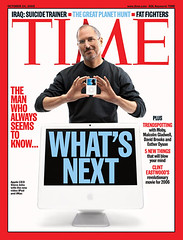 Should these matters be private?
Should these matters be private?
- The state of Steve Jobs‘ health. Jobs heads a business valued at US$140bn, its stock trades publicly on the NASDAQ.
- The possible extra-marital liaisons of John Edwards. Edwards is a former Senator, V-P candidate, and ran for the 2008 Democratic Presidential nomination. He is not a current office holder. His wife is suffering from breast cancer.
- The extra-marital sexual proclivities of Max Mosley. Mosley is President of the Fédération Internationale de l’Automobile which controls Formula 1, a sport franchise that makes about US$4bn a year internationally.
Under emergent European law, increasingly, the answer would be yes to all of them on the grounds of privacy under section 8 of the European Convention on Human Rights.
At the same time, of course, marketers and ISPs are collecting ever more information on all our activities. Mobile phones are virtual tracking devices and their possession almost always now gives access to some kind of electronic recording device.
More of us than ever are choosing to share personal information with strangers online. Our homes can be photographed from space, our emails tracked.
Given the commercial and governmental inroads into privacy, what are the arguments for extending the concept in respect of the media? Does it simply mean providing a legal remedy for ‘excess’ or ‘unwarranted’ publicity?
In case you think this is purely academic, remember the decision of the European Court of Human Rights in the case of Caroline von Hannover who had been photographed in public (the brilliantly titled Von Hannover v. Germany):
[W]hile the general public might have a right to information, including, in special circumstances, on the private life of public figures, they did not have such a right in this instance.
The Court considered that the general public did not have a legitimate interest in knowing Caroline von Hannover’s whereabouts or how she behaved generally in her private life even if she appeared in places that could not always be described as secluded and was well known to the public.
Even if such a public interest existed, just as there was a commercial interest for the magazines to publish the photographs and articles, those interests had, in the Court’s view, to yield to the applicant’s right to the effective protection of her private life.
2 responses to “Privacy and the media”
Adrian,
That’s a good article which I have taken up chez Polis:
http://www.charliebeckett.org/?p=791
What I wanted to ask you was when was the last time there was a decent public inquiry about privacy and the media by a Select Committee, think-tank or policy body? Shall we start one?
cheers
Charlie
[…] Adrian Monck poses some very good questions along those lines but for real people. Adrian asks whether the following matters should be private?: […]